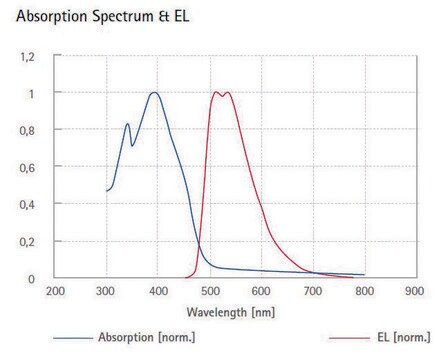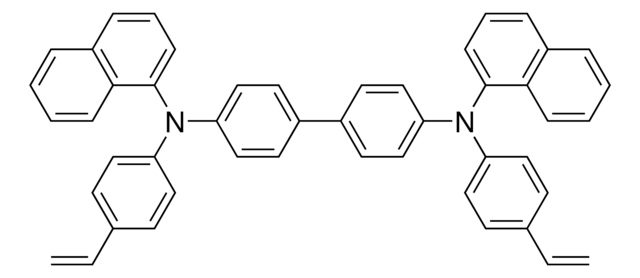900438
Super yellow light-emitting PPV copolymer
Synonym(s):
Livilux®, PDY-132
Sign Into View Organizational & Contract Pricing
All Photos(1)
About This Item
Recommended Products
General description
Super yellow light emitting PPV copolymer can form a thin film of poly(1,4-phenylenevinylene) (PPV) with high efficiencies. It has conjugated polymers as the backbone that can be soluble in water upon the incorporation of lipophilic solubilizing linkers.
Application
Features:
Typical performance measured in standard device stack (ITO/PEDOT: PSS 20 nm/PDY-132 80 nm/Ba 6 nm/Ag 150 nm):
- soluble super yellow light-emitting PPV copolymer
- excellent reproducibility
- broad emission spectrum
- very high efficiency
- very low operation voltage/for PM 100000 cd/m2 pulsed <10 V
- very long DC & AC lifetime
Typical performance measured in standard device stack (ITO/PEDOT: PSS 20 nm/PDY-132 80 nm/Ba 6 nm/Ag 150 nm):
- max. efficiency: 11 Cd/A
- V_on: 2.2 V
- V @ 100 cd/m2: 3.0 V
- V @ 1000 cd/m2: 4.3 V
- max. power eff.: 10 lm/W
- external quantum eff.: 5.3%
- CIE1931 @ 100 cd/m2: (0.50, 0.49)
- DC lifetime @ 100 cd/m2 @ RT: >>220000
- AC lifetime @ 200 cd/m2 @ RT: 11000
PDY-132 can be used in the preparation of electroluminescent line material, which can be used for making line art by direct-write patterning. It can also be used as a fluorescent material with the absorption peak at 450 nm, that can be developed by blade coating on the substrates of the transfer printed micro-sized light emitting diodes (μLED).
Legal Information
Livilux is a registered trademark of Merck KGaA, Darmstadt, Germany
Storage Class Code
11 - Combustible Solids
WGK
WGK 3
Flash Point(F)
Not applicable
Flash Point(C)
Not applicable
Choose from one of the most recent versions:
Already Own This Product?
Find documentation for the products that you have recently purchased in the Document Library.
Customers Also Viewed
Luminescent line art by direct-write patterning
Lindh EM, et al.
Light: Science & Applications, 5(3), e16050-e16050 (2016)
Transfer-printed micro-LED and polymer-based transceiver for visible light communications
Rae K, et al.
Optics Express, 26(24), 31474-31483 (2018)
Light-emitting polymers-The shape of things to come?
Burn PL and Samuel ID
Materials Today, 1(4), 3-5 (1998)
Related Content
Organic electronics utilizes organic conductors and semiconductors for applications in organic photovoltaics, organic light-emitting diodes, and organic field-effect transistors.
Our team of scientists has experience in all areas of research including Life Science, Material Science, Chemical Synthesis, Chromatography, Analytical and many others.
Contact Technical Service
![Poly[2-methoxy-5-(2-ethylhexyloxy)-1,4-phenylenevinylene] average Mn 40,000-70,000](/deepweb/assets/sigmaaldrich/product/structures/344/488/b8f8179d-3970-4deb-a754-adda88cdb36f/640/b8f8179d-3970-4deb-a754-adda88cdb36f.png)







![Poly[9,9-bis-(2-ethylhexyl)-9H-fluorene-2,7-diyl] light-emitting λem 409 nm (in chloroform)](/deepweb/assets/sigmaaldrich/product/structures/186/919/a69a261c-1d02-44b4-82ab-119ad6c9d843/640/a69a261c-1d02-44b4-82ab-119ad6c9d843.png)